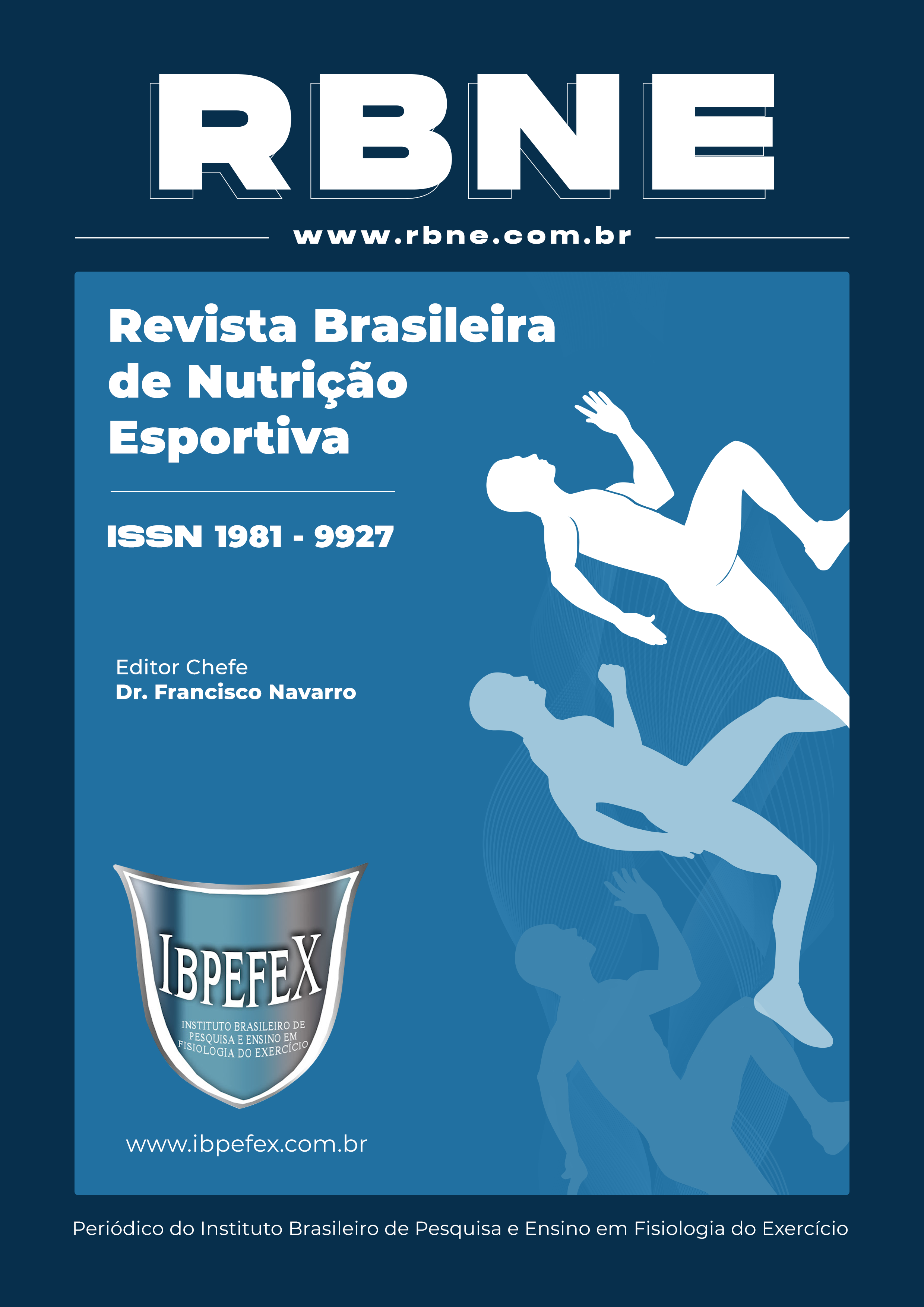The effects of creatine monohydrate supplementation on physical exercise
Abstract
Introduction e objective: Creatine is a food supplement that has been widely used due to its potential effect on physical performance, increasing muscle performance in physical exercise practitioners and even acting to combat the loss of muscle mass related to aging. The objective of the present study was to analyze published scientific literature regarding the use of Creatine supplementation in the practice of physical exercise in adults and the elderly. Materials and methods: The search was conducted using databases such as PubMed, Scielo and Lilacs and was limited to original, randomized studies carried out with human beings, published in the last ten years and in English, Portuguese and Spanish. A total of 415 articles were retrieved, 40 of which were selected by title, and after reading the abstracts, 28 were discarded based on established criteria. After that, the selected articles were submitted to a methodological quality assessment using the Jadad scale. Results: Twelve articles were evaluated, corresponding to randomized studies, half in adults and half in the elderly, most of which evaluated male individuals. Creatine supplementation protocols varied in terms of amount and duration. The evaluated outcomes varied between strength, fatigue index, power, resistance, neutralization of mass loss induced by aging. Conclusion: In general, studies have shown that resistance exercise associated with the use of creatine improves different points in muscle performance, as well as neutralizing the loss of lean mass in the elderly.
References
-Aguiar, A.F.; Januário, R.S.B.; Pires Junior, R.; Gerage, A.M.; Pina, F.L.C.; Nascimento, M.A.; Padovani, C.A.; Cyrino, E.S. Long-term creatine supplementation improves muscular performance during resistance training in older women. European Journal of Applied Physiology. Vol. 113. Num. 4. 2013. p. 987-996.
-Anvisa. Agência Nacional de Vigilância Sanitária. Resolução RDC nº 18. 27 de abril de 2010.
-Bernat, P.; Candow, D.G.; Gryzb, K.; Butchart, S.; Schoenfeld, B.J.; Bruno, P. Effects of high-velocity resistance training and creatine supplementation in untrained healthy aging males. Applied Physiology, Nutrition, and Metabolism. Vol. 44. Num. 11. 2019. p. 1246-1253.
-Chami, J.; Candow, D.G. Effect of Creatine Supplementation Dosing Strategies on Aging Muscle Performance. Journal of Nutrition, Health and Aging. Vol. 23. Num. 3. 2019. p. 281-285.
-Cooper, R.; Naclerio, F.; Allgrove, J.; Jimenez, A. Creatine supplementation with specific view to exercise/sports performance: An update. Journal of the International Society of Sports Nutrition. Vol. 9. 2012.
-Gualano, B.; Macedo, A.R.; Alves, C.R.R.; Roschel, H.; Benatti, F.B.; Takayama, L.; Pinto, A.L.S.; Lima, F.R.; Pereira, R.M.R. Creatine supplementation and resistance training in vulnerable older women: A randomized double-blind placebo-controlled clinical trial. Experimental Gerontology. Vol. 53. 2014. p. 7-15.
-Johannsmeyer, S.; Candow, D.G.; Brahms, M.; Michel, D.; Zello, G.A. Effect of creatine supplementation and drop-set resistance training in untrained aging adults. Experimental Gerontology. Vol. 83. 2016. p. 112-119.
-Kaviani, M.; Abassi, A.; Chilibeck, P. D. Creatine monohydrate supplementation during eight weeks of progressive resistance training increases strength in as little as two weeks without reducing markers of muscle damage. Journal of Sports Medicine and Physical Fitness. Vol. 59. Num. 4. 2018. p. 608-612.
-Mills, S.; Candow, D.G.; Forbes, S.C.; Neary, J.B.; Ormsbee, M.J.; Antonio, J. Effects of creatine supplementation during resistance training sessions in physically active young adults. Nutrients. Vol. 12. Num. 6. 2020. p. 1-11.
-Pinto, C.L.; Botelho, P.B.; Carneiro, J.A.; Mota, J.F. Impact of creatine supplementation in combination with resistance training on lean mass in the elderly. Journal of Cachexia, Sarcopenia and Muscle. Vol. 7. Num. 4. 2016. p. 413-421.
-Painelli, V.S.; Benati, F.B.; Lancha, A.H. Creatine supplementation prevents acute strength loss induced by concurrent exercise. European Journal of Applied Physiology. Vol. 114. Num. 8. 2014. p. 1749-1755.
-Wang, C.C.; Fang, C.C.; Lee, Y.H.; Yang, M.T.; Chan, K.H. Effects of 4-week creatine supplementation combined with complex training on muscle damage and sport performance. Nutrients. Vol. 10. Num. 11. 2018. p. 1-10.
-Yanez Silva, A.; Buzzachera, C.F.; Picarro, I.C.; Januario, R.S.B.; Ferreira, L.H.B.; MacAnulty, S.R.; Utter, A.C.; Souza Junior, T.P. Effect of low dose, short-term creatine supplementation on muscle power output in elite youth soccer players. Journal of the International Society of Sports Nutrition. Vol.14. Num. 1. 2017.
-Zuniga, J.M.; Housh, T.J.; Camic, C.L.; Hendrix, R.; Mielke, M.; Johnson, G.O.; Hpush, D.; Schmidt, R.J. The Effects of Creatine Monohydrate Loading on Anaerobic Performance and One-Repetition Maximum Strength. Journal of Strength and Conditioning Research. Vol. 26. Num. 6. 2012. p. 1651-1656.
Copyright (c) 2024 Marina Silveira Penadez, Alessandra Doumid Borges Pretto, Nadine Costa Gonçalves, Gustavo Vinícius Monteiro Duarte, Romina Buffarini

This work is licensed under a Creative Commons Attribution-NonCommercial 4.0 International License.
Authors who publish in this journal agree to the following terms:
- Authors retain the copyright and grant the journal the right of first publication, with work simultaneously licensed under the Creative Commons Attribution License BY-NC which allows the sharing of the work with acknowledgment of the authorship of the work and initial publication in this journal.
- Authors are authorized to enter into additional contracts separately for non-exclusive distribution of the version of the work published in this journal (eg, publishing in institutional repository or book chapter), with acknowledgment of authorship and initial publication in this journal.
- Authors are allowed and encouraged to post and distribute their work online (eg, in institutional repositories or on their personal page) at any point before or during the editorial process, as this can bring about productive change as well as increase impact and impact. citation of published work (See The Effect of Free Access).






